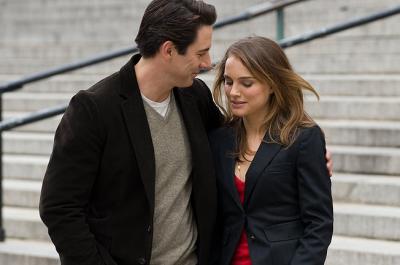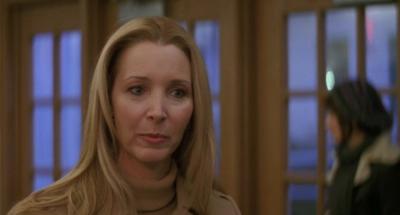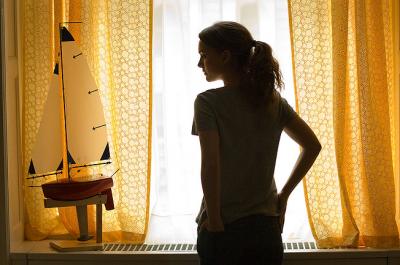By: debbie lynn elias

There were high hopes out of Toronto last year after the screening of “Love And Other Impossible Pursuits.” Starring Natalie Portman and Lisa Kudrow as the big name attractions, writer/director Don Roos’ adaptation of the novel of the same name by Ayelet Waldman, is a prime example of often understated, thoughtful and thought provoking filmmaking, albeit at times, flawed. After sitting on a shelf for a year, the film has now been dusted off and repackaged as THE OTHER WOMAN, with a timely release that not only capitalizes on Natalie Portman’s accolades for “Black Swan”, but provides the audience with a glimpse into the emotional acting journey that now makes Natalie Portman a force to be reckoned with as a major star.
Emelia Greenleafe is a typical Harvard law graduate. With high hopes and high aspirations (and big ego), she has joined one of New York’s top law firms as an associate attorney. But from day one, it’s evident that her hopes and aspirations consist of more than climbing the corporate ladder to partnership; she has her on Jack, one of the senior attorneys and who is very married with a young son. Despite law firm protocol, Emilia is not about to be deterred in her pursuits of success and Jack and makes that known at the firm Christmas party hosted by Jack and his uber successful ob/gyn wife, Carolyn. As timing and luck would have it, not too long after, an opportunity presents itself where Emelia is tapped to assist with and out-of-town discovery phase of some critical litigation on a case belonging to Jack. Needless to say, being out-of-town opened up all kinds of new avenues of discovery for both Emilia and Jack as a late deposition session soon moved into Emelia’s hotel room. Filled with mutual lust and mixed with a wife from whom Jack had “grown apart” and who “didn’t understand” him anymore, the passion that erupts between the two could register on the Richter Scale. Ironically, as Emilia gets pushier and more demanding about Jack getting a divorce, she finds herself pregnant.

Walking away from his wife and son, Jack marries Emilia and they try to blend their new family with Jack’s old, and that includes his son William and ex-wife Carolyn. William is a tough sell though and Emilia is embattled with always trying to prove herself. But there is hope with the birth of Isabel. Sadly, three days after her birth, Isabel dies of Sudden Infant Death Syndrome, plunging Emilia into an anger fueled depression that still rages after eight months, as she teeters on what appears to be the edge of sanity with William, Carolyn, Jack and even her own father, the brunt of her rage and blame. But what is really behind her demise?
Natalie Portman truly comes into her own as Emilia, completing the transition from child/youth actress into a thespian for the ages. As Emilia she brings this edgy uncertainty that has a forced quality to it, boding very well for the dynamic between Emilia and everyone else in the film. It gives the relationships this great strained quality that propels the film forward. Portman is consistent with an uncertain introspective rage and irrationality that bleeds emotion. On the flip side, she also brings a lightness and warmth to Emilia in several sweet scenes with Charlie Tahan’s William. Having now seen THE OTHER WOMAN, one can appreciate Portman’s performance in “Black Swan” even more and see the growth of this actress.

The two performances, however, that just leap off the screen are that of Lisa Kudrow and Charlie Tahan. Tahan just blew me away as William, driving the emotion of the film home. The innocence of a child as to the world around him and emotion in general, combined with a brilliant intellectual sincere precociousness that Tahan brings to Charlie, is a perfect foil to Portman’s emotionally scarred Emilia. Tahan’s cadence and dictive staccato actually mirror that of Kudrow’s lending to an appreciated startling effect. As for Kudrow, the staccato vocal and emotional bitchy freneticsm she brings as Carolyn really fuels the film and amps the energy. Whenever Kudrow is on screen, the energy level just skyrockets. She is divine. Scott Cohen gives the film a great grounding as the weak and often blandly indecisive Jack, serving as a nice balance to the two different emotional extremes brought by Portman and Kudrow.

Written and directed by Don Roos, his adaptation of Waldman’s novel is solid in its character portrayals and believability of story. Using Charlie – and the memory of Isabel – as catalysts for the conflict contained within the adult plotlines, provides a clarity and simplicity of issues. This is a story that has been told time and time again, but here, with the catalyst, and often the viewfinder, being that of a child’s eye, we are given an entirely different interpretation that expands both the mind and the heart. It was impossible to look away from the screen as you develop a relationship with each of the characters, yourself wanting to see what happens. Can there be truth and healing and acceptance? In the end, it is Charlie that I found myself rooting for, hoping that he would get the family, the whole family, that he envisioned in an art class drawing. Where the adaptation finds its flaws, however, is with the father-daughter relationship between Emelia and her father. It goes to an extreme of disbelief and at its climax, is played out with gross insensitivity in the presence of an 8 year old child. And while Lisa Kudrow’s performance as Carolyn is first rate, there are times I felt Roos went for the stereotypical disgruntled bitchy ex-wife dialogue which, to Kudrow’s credit, she sparked with a uniquely different and honest emotional take and delivery.

Don Roos has a good eye for intimate character portraiture and through some inventive and unusual camera angles gives us a revealing visual that parallels the emotional gravitas of the story. Steve Yedlin’s cinematography excels with tonal lighting that sets the emotional stage. Likewise, Michael Shaw’s production design is appropriate and ties in well with the economic strata of the principals.
THE OTHER WOMAN pushes all the right buttons without feeling like a Lifetime movie. Surprisingly, there are no loose ends come film’s end giving the audience a sense of satisfaction and emotional food for thought.
Emilia – Natalie Portman
Carolyn – Lisa Kudrow
William – Charlie Tahan
Jack – Scott Cohen
Written and Directed by Don Roos based on the novel “Love And Other Impossible Pursuits” by Ayelet Waldman











